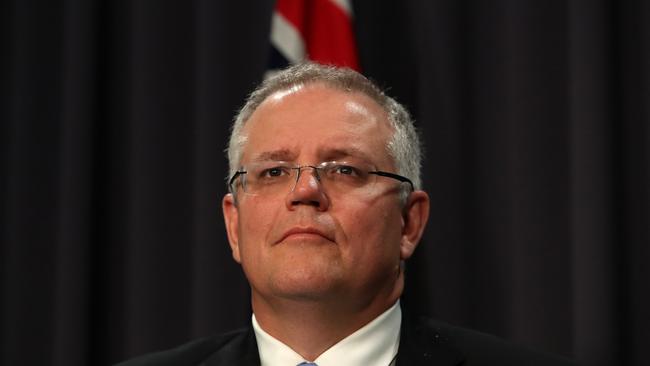
Scott Morrison has laid a lethal charge against Peter Dutton, saying his proposal to remove the GST from household power bills would be “an absolute budget blowout” — implying Morrison would not implement such a proposal as Treasurer.
Morrison’s rejection of Dutton’s initiative — his most specific new proposal as alternative prime minister — highlights a Dutton/Morrison problem and raises the issue of whether Morrison would be treasurer in a Dutton government or the terms on which he would be treasurer.
Morrison said yesterday the cost of Dutton’s proposal would be $7.5 billion across the forward estimates and it was obvious that, if the states and territories lost this amount of GST revenue, they would demand full compensation from the national government. Dutton said earlier he felt the GST removal could be achieved “straight away”.
“Any change to the GST, as you know, to its rate or its base has to be agreed by all states and territories and I’m sure that they would say ‘well, if you want to do it, that’s fine, send us $7.5bn’,” Morrison said. “Now, that would be a budget blower, an absolute budget blower and, on top of that, or the alternative would be to scuttle the Western Australia GST package.”
Morrison repudiated Dutton’s proposal on the grounds of fiscal policy, tax policy and as a false response to high power prices.
The significance of their split over the GST is the prospect of sharp policy differences between Dutton and Morrison in any new government. This goes to the question of how radical might be Dutton’s economic policy changes as prime minister.
An erosion of the GST base in the cause of cutting power bills is a revealing stance. Dutton’s remarks suggest he sees this as an immediate priority. “I think one of the things that we could do straight away, in this next billing cycle, is take the GST off electricity bills for families,” Dutton said. “It would be an automatic reduction of 10 per cent for electricity bills and people would feel an impact straight away. It would be a down payment on other things that you could do to help reduce those electricity bills.”
This prompted immediate criticism from Malcolm Turnbull and Morrison, with the Treasurer arguing this was the wrong way to address the power crisis. Morrison said the key to cheap power bills was a “safety-net price to ensure the standard offer comes down to the default price”. This would be reinforced by “having a big stick to keep the energy companies in line” plus backing for new generation investment.
Labor seized upon Dutton’s GST proposal, Treasury spokesman Chris Bowen branding it a “thought bubble” and saying the loss of such revenue for the states meant they would have “no choice” but to cut back services, notably health and hospitals. In terms of Labor’s campaign, every step Dutton takes leads back to cuts to Medicare and hospitals.





To join the conversation, please log in. Don't have an account? Register
Join the conversation, you are commenting as Logout